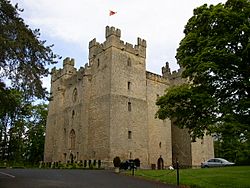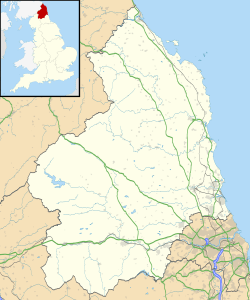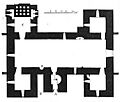Langley Castle facts for kids
Quick facts for kids Langley Castle |
|
|---|---|
| Langley, Northumberland in England | |

Langley Castle, 2005
|
|
| Coordinates | 54°57′22″N 2°15′32″W / 54.956°N 2.259°W |
| Grid reference | NY835624 |
| Type | Tower house |
Langley Castle is an amazing old castle that has been fixed up. It's now a hotel where people can stay! You can find it in a village called Langley in Northumberland, England. This castle is really important, so it's called a Grade I listed building.
Contents
The Story of Langley Castle
Langley Castle was built a long, long time ago, in the middle of the 1300s. A knight named Sir Thomas de Lucy had it built. It was designed like a big "H" shape and had four floors.
Before this castle was built, the land belonged to powerful families called the Barons of Tynedale in the 1100s.
A Castle Under Attack
In 1405, the castle faced a big challenge. It was attacked and badly damaged by the army of King Henry IV. This happened during a fight against some other powerful families and an important church leader. After this attack, the castle was left in ruins for a very long time.
Bringing the Castle Back to Life
The castle stayed a ruin until 1882. That's when a local historian, Cadwallader Bates, bought it. He started the huge job of fixing it up.
When Bates passed away in 1902, his wife, Josephine, kept working on the restoration. She continued until she died in 1932.
New Uses for the Old Castle
After Josephine died, the castle was empty for a while. But during the Second World War, it was used as a place for soldiers to stay. After the war, it became a school for girls!
In the 1980s, the Robb family bought the castle. Then, in 1986, a professor from the Massachusetts Institute of Technology named Dr Stuart Madnick bought it. He turned the castle into the fancy hotel it is today.
Cool Features of the Castle
Langley Castle sits in a beautiful forest area that is about 10 acres big. One of the most interesting parts of the castle is its south-west tower. This tower has 12 special rooms called garderobes. These were like old-fashioned toilets, with four on each floor!
Images for kids
 | William M. Jackson |
 | Juan E. Gilbert |
 | Neil deGrasse Tyson |



